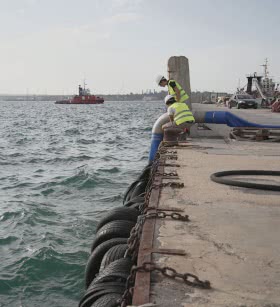
At first glance, and to a layman, removing carbon dioxide
from the atmosphere and putting it into the sea seems a bit like hiding the
dust under a carpet. However, there are several
projects for the storage of CO2 at sea, such as the
"Porthos" project which plans to inject 2.5 million
of carbon dioxide per year under the North Sea seabed
 (
(
of
8
November 2023). Paradoxically, projects are also underway for
extract CO2 from the sea, such as that carried out by the
California-based Captura aimed at removing carbon dioxide from
upper layers of the oceans by improving the capacity of the
ocean waters to extract more carbon from the air. Per
profane, or rather ignorant, these seem to be three-card games
to divert from the real problem: that of reducing the emissions of
carbon produced by humans. But, evidently, the real answer
problem is to address it both at the root and by reducing its
effects on the climate.
 Among the projects that plan to store CO2 at sea is
the one designed and built in the port of Augusta by the startup
Italian Limenet, which in 2023 had already experimented in La
Spezia a pilot project with CO2 sequestration. In the Sicilian port
The company has created a system capable of removing
annually from the air 800 tons of carbon dioxide and
stored at sea through a chemical process, in the form of
calcium bicarbonates. Stefano Cappello, CEO and
founder of Limenet, explained that Augusta's is the
the startup's first industrial plant built after years of
research and experiments and - he added - "marks a step
significant in the development of our technology and
growth of the company. In the last year - he announced
Cappello - we sold the first CO2 credits equivalent to
1,000 tonnes of negative emissions thanks to the agreement with
KlimaDAO and concluded an acceleration course at Faros,
accelerator of the blue economy of the CDP Venture Capital network.
Thanks to the collaboration with the Port System Authority
of the Eastern Sicilian Sea and with the Municipality of Augusta, we have
launched the first carbon removal project in Italy in 2014
sea through calcium bicarbonates".
Among the projects that plan to store CO2 at sea is
the one designed and built in the port of Augusta by the startup
Italian Limenet, which in 2023 had already experimented in La
Spezia a pilot project with CO2 sequestration. In the Sicilian port
The company has created a system capable of removing
annually from the air 800 tons of carbon dioxide and
stored at sea through a chemical process, in the form of
calcium bicarbonates. Stefano Cappello, CEO and
founder of Limenet, explained that Augusta's is the
the startup's first industrial plant built after years of
research and experiments and - he added - "marks a step
significant in the development of our technology and
growth of the company. In the last year - he announced
Cappello - we sold the first CO2 credits equivalent to
1,000 tonnes of negative emissions thanks to the agreement with
KlimaDAO and concluded an acceleration course at Faros,
accelerator of the blue economy of the CDP Venture Capital network.
Thanks to the collaboration with the Port System Authority
of the Eastern Sicilian Sea and with the Municipality of Augusta, we have
launched the first carbon removal project in Italy in 2014
sea through calcium bicarbonates".
Highlighting the significant beneficial effects of the initiative to
the marine ecosystem, the president of the Sicilian Port Authority, Francesco Di
Sarcina - underlined that "the role of our institution is
also that of protecting the sea, as well as the territory.
We must consider the sea - he pointed out - as the center of life
of our economy and our trade, therefore it is
it is necessary to protect it. For these reasons, we have accepted, with
attention and strong interest, the Limenet initiative that
gives the port of Augusta a world record in the air-sea passage
of carbon dioxide and can be a stimulus for other
Italian port facilities, and beyond, in order to adopt
Powerful and effective tools in protecting the environment
marino".